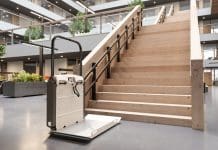Awareness is the key to opening up buildings and facilities to disabled people. If you know what sort of needs disabled people have, and how those needs can be met – and denied – then you have a better chance of ensuring your organisation is inclusive.
At About Access we are always willing to share our expertise. Many of our clients prefer to engage us to study their existing buildings or their plans for new developments and carry out an access audit or design appraisal as appropriate.
But in some cases they will ask us to provide training which is bespoke for their staff and their properties. Usually this will be influenced by the size of the organisation, the number of sites which it operates and the need to be able to develop an in-house capability to anticipate and address issues around disability.
We can show businesses and other organisations how to carry out their own access audits and design appraisals. We also present courses on general disability awareness, and these are relevant to any organisation which employs staff or receives visitors.
The courses help to create a more inclusive environment that anybody can use – not only disabled people but also parents with prams and pushchairs. It is beneficial because it means more people are able to do business with you, and that helps your bottom line. It’s also the right thing to do.
Organisations have to comply with the Equality Act, which means they need to be aware of any access issues. It is not just about protecting yourself from complaints and possible litigation. It is also about being more welcoming to more people, and it is about helping your organisation to develop. An access audit report might be used for a bid for grant funding, or it might be required by a bank or building society if you are applying for a mortgage.
An access audit is recognised as a good way of identifying the problems that disabled people can face in using a building. It will help you address any issues with the day-to-day access to and within your premises and it also gives you a starting point for planning special events which might attract people who you don’t know into your building for the first time.
Our access audit course lasts two days and focuses on user needs and how they can be accommodated. We explain the problems that can exist within the built environment and we look at what should be included in the audit and what can be omitted. We don’t limit our guidance to the Equality Act because we are aware that other legislation may also have implications.
We provide access audit courses for businesses and for membership organisations, for example a trade group covering a particular sector such as hotels. We can study an individual site or cover the main principles. We can also tailor the course towards particular property types, for example sports buildings and entertainment venues. We also provide general information for people to consider when they have responsibility for a number of different buildings.
The course includes practical training, so will ideally take place at a client’s premises, but we can use any venue and on occasions we will offer an open course, ideal for small businesses which do not have the resources or requirement for a team session.
Once you have collected the data from the access audit you have to present it. We show you how to produce a report by working your way through your findings to demonstrate whether anything in the building needs to be altered and to indicate the priorities – whether any remedial work needs to be immediate, can wait for six months or be included in the next scheduled refurbishment.
The approach to design appraisals is similar but instead of working with an existing building you are studying the project at the drawing stage and your comments are only relevant to the design that you are reviewing. As the design progresses you can start to examine the detail of such features as handrails and doors, toilet layouts and surface finishes.
It is obviously better to get the design right before a property is built. We help you do this with a one-day course which looks at user needs, briefs you on current guidance and legislation and directs you through the appropriate styles of report.
While training in access audits and design appraisals is all about the buildings, our disability awareness training carries much wider relevance.
The aim is to help you and your staff to develop a better understanding of the disabled population at large and the etiquette and language that should be used.
Identifying disabilities is key because they are not always obvious, and some people are afraid to interact with disabled people. Our course is designed to give you the confidence to ask the right questions to find out whether a person needs assistance and to then establish how they would like to receive that assistance.
Online booking systems make it easier to ask sensitive questions and make helpful suggestions, for example whether a person would like to sit close to changing facilities.
On the phone or face to face you have to be more alert to the techniques for identifying a person’s access requirements with a process of open questions rather than closed questions.
There’s nothing worse than diving in and helping someone across the road when all they were doing was standing near a crossing and admiring the view!
But how would you guide a blind or partially-sighted person? What sort of subtle, extra assistance can you provide to help them order from a menu in a restaurant? How can you help someone who has to fill in a form and doesn’t want to divulge that they have a learning difficulty?
Disabled people want to do as much as they can for themselves but, knowingly or not, society puts barriers in their way. It all comes down to making sure that customer service embraces the needs of disabled people, and you can achieve that by having the right staff attitude and training.
About Access provides services concerned with accessibility for disabled people. Our aim is to help organisations avoid costly and damaging conflict by ensuring that their premises are accessible. We also work to make sure staff are properly trained, and recognise how things can be disabling to customers and colleagues as individuals whose requirements and treatment are key to the wellbeing of a business.
Managing Director Ian Streets is a member of the National Register of Access Consultants, the Access Association and Network Rail’s Built Environment Access Panel (BEAP) and as such works with BSI Standards, the UK’s national standards body, to advise on appropriate designs for buildings and their surrounding areas.
If you want to know more, or you have a question or concern, please contact us at info@aboutaccess.co.uk













